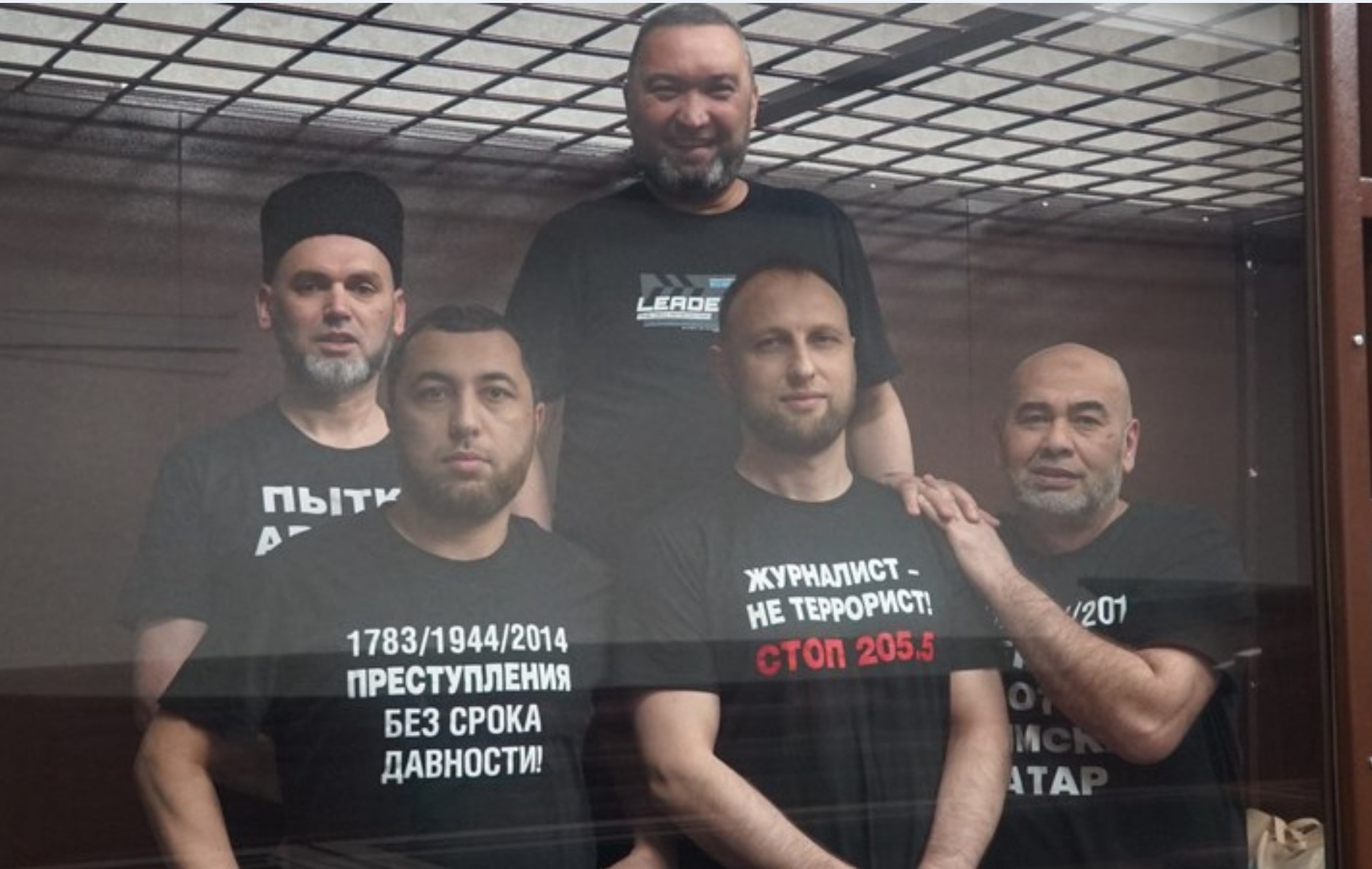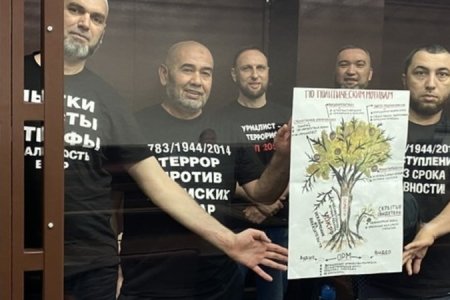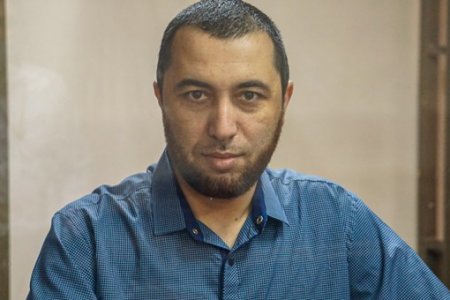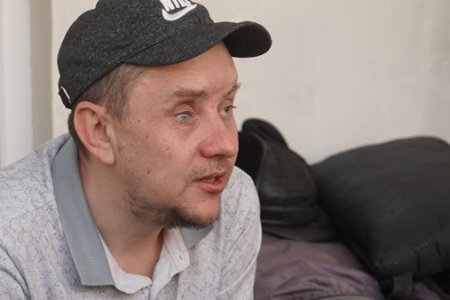
Russia’s most brazen attack to date on the Crimean Tatar human rights movement ended on 1 February with 13 and 14-year sentences upheld against three Crimean Solidarity journalists Osman Arifmemetov; Rustem Sheikhaliev and Ruslan Suleimanov and two civic activists – Enver Ametov and Yawar Muyedinov. They and 20 other Crimean Tatars were arrested solely for their civic stand and their refusal to remain silent about the repression that Russia has brought to occupied Crimea. The mass arrests elicited international condemnation of Russia’s use of ‘terrorism’ charges to crush human rights activism. Russia’s only response was to try to deflect publicity by sentencing the men in five cloned ‘trials’, with the sentences from the last of these having now, tragically, come into force.
These were ‘trials’ in name alone, since a ‘guilty’ verdict was essentially clear back on 27 March 2019 when armed and masked enforcement officers burst into Crimean Tatar homes and prevented lawyers from being present while they carried out ‘searches’. The only thing the FSB was ever looking for was so-called ‘prohibited literature’, which in the majority of cases the FSB bring themselves and pretend to find.
Most of those arrested that day had themselves devoted a lot of time to attending the political trials of other Crimean Tatars, both to show moral support and to ensure that information was passed to human rights groups and to the international community about repression under Russian occupation. One of the most active of the Crimean Solidarity civic journalists was Osman Arifmemetov. During his final address to Russia’s military court of appeal in Vlasikha (Moscow region) on 29 January, Arifmemetov continued that vital work, this time speaking about the appalling infringements in his own ‘trial’. He referred to the three ‘judges’ from the Southern District Military Court in Rostov as a ‘troika’, like the notorious threesomes used during Stalin’s Terror. Instead of paying heed to the glaring infringements that the defendants and their lawyers had pointed out, this ‘troika’ had simply complained that they were using ‘delaying tactics’.
Arifmemetov answered those (including, doubtless, the ‘judges’ in these trials) who ask why they even bother when the outcome is so clear. “I’ll tell you. The point is that we have a sense of responsibility for our people. A sense of responsibility is an emotional state which prompts a person to think about ways of resolving the problems that disturb them. We are limited by the non-violent method of struggle that we have chosen, but we are not limited in the ways and forms we use within the framework of such a struggle. One such form is the struggle within a legal framework. Let the world see how the FSB falsifies evidence in their fight against dissidents, how prosecutors and judges collaborate in the fabrication of these cases.”
Although Arifmemetov rightly goes on to note how the state media collaborates with the FSB and authorities in trying to present such persecution as ‘the fight against terrorism’, all of the men are internationally recognized as political prisoners. Arifmemetov himself received a letter from prominent US political philosopher Francis Fukuyama in which the latter thanked him for his courageous work in telling the world what was happening under Russian occupation.
Arrests as attack on the Crimean Tatar human rights movement
23 Crimean Tatar journalists and activists were arrested on 27 March 2019, as well as two other activists Rayim Aivazov and Ruslan Suleimanov’s brother, Eskender Suleimanov, a little later.
Both the US State Department and the EU called the move illegal and demanded the men’s release. Human Rights Watch called the arrest “an unprecedented move to intensify pressure on a group largely critical of Russia’s occupation of the Crimean Peninsula” and stated unequivocally that attempts “to portray politically active Crimean Tatars as terrorists” is aimed at silencing them. Freedom House and Civil Rights Defenders called the arrests “yet another serious abuse of power by the de facto authorities, transparently aimed at striking fear into a community that has suffered severely during Russia’s occupation of Crimea”. The Memorial Human Rights Centre was swift to declare all the men political prisoners and denounce the attempt “to crush the Crimean Tatar human rights movement”. The Committee to Protect Journalists has written about the persecution of Rustem Sheikhaliev and notes that “Russia has a track record of using terrorism and extremism laws to silence critics and muzzle independent news coverage.”
No ‘terrorism’
Although Russia is using charges of ‘terrorism’ (Article 205.5) and of ‘plans to violently overthrow the state’ (Article 278), all 25 Crimean Tatars were accused solely of unproven ‘involvement’ in the Hizb ut-Tahrir movement, a peaceful transnational Muslim party which is legal in Ukraine and which is not known to have carried out acts of terrorism anywhere in the world. Russia has never provided any grounds for its highly secretive 2003 Supreme Court ruling that declared Hizb ut-Tahrir ‘terrorist’, yet, since 2014, it has been using the ruling as justification for huge sentences. In occupied Crimea, such prosecutions and sentences are very clearly used as a weapon against Crimean Tatar civic journalists and activists.
All of the men were immediately placed in detention, including Dzhemil Gafarov, who had grave medical conditions that should, even by Russian standards, have precluded imprisonment. He died a year ago, having been effectively tortured to death in Russian captivity. Five men, including prominent journalist Remzi Bekirov, were charged with the more serious ‘organizing’ of a Hizb ut-Tahrir group (Article 205.5 § 1 of Russia’s criminal code). All others, including the five whose sentences were upheld on 1 February were accused of ‘involvement’ in this totally mythical ‘Hizb ut-Tahrir group’ (Article 205.5 § 2).
No Evidence
Arifmemetov, who is an IT teacher, as well as a civic journalist, pointed to the clear signs of tampering and montage of the illicitly taped conversation which was treated as ‘evidence’ to back the charges. It was nothing of the kind, but a conversation on religious and political subjects some three years prior to the men’s arrests. Had there seriously been grounds for accusing the men of ‘terrorism’, why would the FSB have sat on the tape for three years? There were also glaring discrepancies between the actual tape and the purported transcript of what is said. Some of the mistakes were too critical to believe them accidental. The FSB sends such ‘transcripts’ to its own ‘experts’, who lack any competence to provide the demanded assessments, but can be relied upon to claim ‘proof’ to back the charges. In this case, as in most, the defence presented the opinion of independent specialists who found, among other things, evidence that the tape had been tampered with.
The main part of the ‘evidence’ came from entirely anonymous ‘witnesses’ who may not even know the men. In one case, such an alleged witness, was demonstrated in court to have changed his supposed ‘testimony’ to fit changes in the prosecutor’s charges.
A 2021 report by the UN’s Secretary General was extremely critical of Russia’s use of anonymous witnesses in occupied Crimea, and of the role played by Russian judges in upholding such practice and preventing the defence from exposing the flaws in this alleged ‘testimony’.
Sentences
The charges were grotesque, the lack of evidence to back them absolutely glaring, yet prosecutor Yevgeny Kolpikov demanded sentences of 15-17 years, with 5 years in a prison. On 24 November 2022, ‘judges’ Viacheslav Korsakov (presiding) Denis Galkin and Igor Shendrikov from the notorious Southern District Military Court in Rostov sentenced Crimean Solidarity civic journalists Osman Arifmemetov; Rustem Sheikhaliev and Ruslan Suleimanov to 14 years, and civic activists Enver Ametov and Yashar Muyedinov to 13 years. In all cases, the first four years are to be in a prison, the harshest of Russian penal institutions.
On 1 February, presiding judge Sergei Aleksandrovich Butusov, together with Maxim Aleksandrovich Panin and Oleg Aleksandrovich Yegorov from the Military court of appeal in Vlasikha upheld these monstrous sentences.
The attack on 25 Crimean Tatars which has already killed one of them, Dzhemil Gafarov and the methods used to secure sentences of up to 19 years need international publicity. It is important that all those FSB operatives, FSB-loyal ‘experts’, prosecutors and judges who take part in these travesties are named and, at very least, placed under international sanctions. Please help in whatever way you can!



